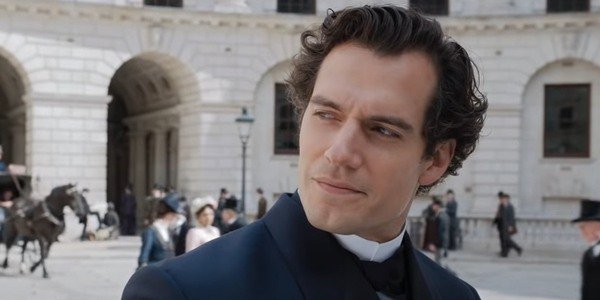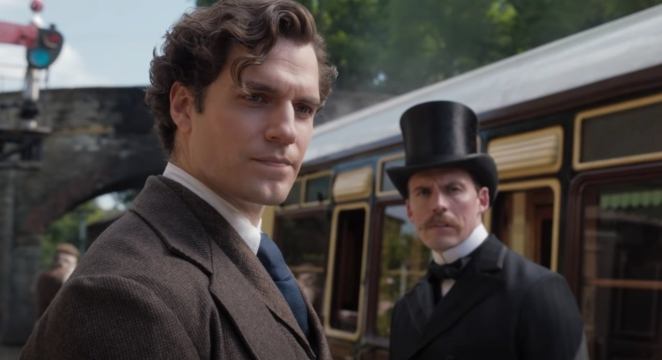
Going into Enola Holmes, there was the basic expectation of a good time. The story seemed sweet, smart, and playful (it was) and the cast was exciting. As expected Millie Bobby Brown put on a great show but there was one quiet performance that stole my heart, dear Reader. I could never have expected how much I would adore Henry Cavill‘s take on the famous literary detective, Sherlock Holmes. Even more so, I was totally unprepared for the conversation he was about to inspire regarding a fresh perspective on iconic male characters.
For the uninitiated, Enola Holmes introduces us to the equally intelligent younger sister of the famous detective, in an adventure all her own. In the film, as Enola follows her path, Sherlock is in the periphery attempting to solve the case for himself. He’s also trying to puzzle through another issue — the role of family. The central conflict of the film surrounds Enola bucking the tradition of a lady, causing a squabble between Mycroft and Sherlock. As Mycroft attempts to rein in their precocious sister, Sherlock sees the value in encouraging her mind and independence. Enola Holmes is based on the YA series of the same name by Nancy Springer and is directed by Harry Bradbeer. Enola is played by the incomparable Millie Bobbie Brown (Stranger Things). Sam Claflin and Helena Bonham-Carter round out the famous Holmes family, as brother Mycroft and the Holmes matriarch respectively.
Henry Cavill’s addition to the cast of Enola Holmes, as Sherlock, was a welcome development. He cuts a classically handsome, but large figure that seems to fit perfectly into the elegant role, despite being a step outside of the usual. This version of Sherlock is not a rugged rogue a la Robert Downey Jr’s take, nor does he align with the highly intellectual interpretations done by Benedict Cumberbatch or Basil Rathbone. Henry Cavill’s character is a man’s man, with a certain softness.
Let’s talk about physicality, more specifically Cavill’s bod. A handsome Sherlock Holmes is nothing new, but it’s exciting to see a physical version of the character that carries the physical presence of someone who’s a boxer and martial arts master. Comparing Cavill to the aforementioned list of famous cinematic Sherlocks contributes to the realization that Hollywood has been very intentional in its previous casting. The Sherlocks that came before were all handsome — but not necessarily “pretty” men. Furthermore, their physiques favored towards slight and lean. It’s a common trope to distinguish brains and brawn in the body, so Cavill is instantly striking as a physically large (imposing?) and traditionally gorgeous Sherlock. His Sherlock is not coded in his appearance for an intellectual (dare I say, nerdy) take, but still — he’s Sherlock Holmes.
The decision to code Sherlock as a more traditional physical action hero is significant. In Enola Holmes, the world of the film (and, by further extension, the iconic Sherlock) are viewed through Enola’s perspective. She’s a young girl, who looks at her brother as the larger than life figure that he is. To her, he’s a man with dominion over the world she seeks to enter. To cast Henry Cavill as Sherlock is to paint the character as the hero that a child or young girl would imagine. It codes him as strong and commanding. What’s really interesting is what Cavill does with it.
The Sherlock of Enola Holmes is not prone to the monologuing of Rathbone or Downey Jr. In fact, Cavill’s Sherlock is demure in comparison to his blustering and emboldened counterparts. The character that Cavill creates is soft-spoken and chooses his words quite wisely. Further, he’s got an emotional intelligence that previous versions of the hero are desperately lacking. Every aspect of Cavill’s version of the character is subtle and softened. And it’s a breath of fresh air.
Consider, for a moment, any famous male character: They come with a catchphrase. They swing down on the vine to save the girl. They swashbuckle. They dominate. They dominate physically in combat (or in physical presence alone, see: the cinematic institution that is The Rock). They dominate the conversation, by sheer volume or by intellect. They dominate culture.
It’s not a surprise that every iconic man of literature and film is a monument to patriarchy. It’s not a surprise (or even a negative) that the giants of culture are these traditionally masculine powerhouses. Great men have been writing great men with the highest of masculine ideals for centuries. None of this is necessarily a bad thing or a smear on those characters… I just had no idea how ready I was for something else.

There is never any doubt, for the viewer, of Sherlock in Enola Holmes. Cavill’s Sherlock is instantly recognizable, by virtue of the character’s own reputation, as a hero and a genius. His mind, power, and capabilities are on display and beyond reproach. But this version of Sherlock does not have to bellow or do battle to announce his presence or establish his strength. In fact, much of Sherlock’s focus is domestic. In Enola Holmes, Sherlock’s own case and professional ambitions play second fiddle to his concern for his sister and by the end of the film he is ready to take a more active role in her life. Sherlock is not the leader or the star, he’s not even that unattainable of an ideal, he’s a supporter.
Sherlock takes a firm stance against his brother Mycroft, softly and confidently. He guides his sister with quiet and gentle reassurance. His ego and his ambitions are second and he is not intimidated by Enola’s own prowess. In a film that speaks to the adventurous ambition of young girls, it’s critical to see their father figure be a steady supporter and encourage female ambition. But, this change works beyond the context of the film. Soft and confident masculinity is the reboot that many of these classic characters desperately need.
In the film, Sherlock is not defined by quips or combat that have come to be associated with the character. All the snark has been swapped out for sweetness. As we reach a point in our culture, where we are comfortable questioning problematic media, it’s natural to wonder, “Where do we go from here?” Portrayals like Henry Cavill’s Sherlock are the answer to that question.
It is just as important for us to see portraits of strong masculinity that can also be gentle, kind, and non-combative as it is to see the Enola’s of the world come into their own. When these famous characters are updated for the hundredth time, there is an opportunity to address their problematic past without smudging the reputation of an icon. Henry Cavill stole my heart and became my favorite Sherlock, all on the softness of a truly warm performance.
Enola Holmes arrives on Netflix on September 23, 2020.






